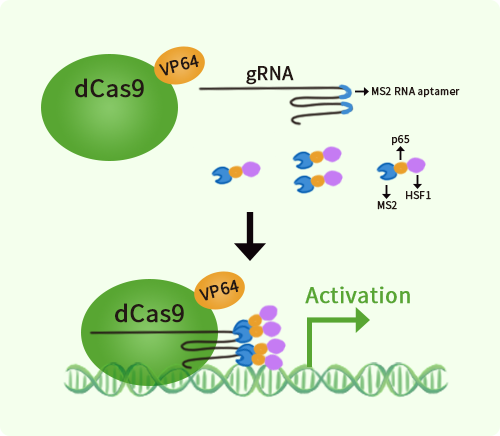Human Polycystin 1 (PKD1) activation kit by CRISPRa
CAT#: GA103572
PKD1 CRISPRa kit - CRISPR gene activation of human polycystin 1, transient receptor potential channel interacting
CNY 12,255.00
Specifications
| Product Data | |
| Format | 3 gRNAs (5ug each), 1 scramble ctrl (10ug) and 1 enhancer vector (10ug) |
| Symbol | PKD1 |
| Locus ID | 5310 |
| Kit Components | GA103572G1, Polycystin 1 gRNA vector 1 in pCas-Guide-GFP-CRISPRa, Target Sequence: AGCGATGAGGGACTGGCATC GA103572G2, Polycystin 1 gRNA vector 2 in pCas-Guide-GFP-CRISPRa, Target Sequence: CACCCTCCGCTCCACAGGGT GA103572G3, Polycystin 1 gRNA vector 3 in pCas-Guide-GFP-CRISPRa, Target Sequence: CGCCCGTCGCACTGTAGAGT 1 CRISPRa-Enhancer vector, SKU GE100056 1 CRISPRa scramble vector, SKU GE100077 |
| Disclaimer | These products are manufactured and supplied by OriGene under license from ERS. The kit is designed based on the best knowledge of CRISPRa SAM technology. The efficiency of the activation can be affected by many factors, including nucleosome occupancy status, chromatin structure and the gene expression level of the target, etc. |
| Reference Data | |
| RefSeq | NM_000296, NM_001009944 |
| Synonyms | PBP; Pc-1; TRPP1 |
| Summary | This gene encodes a member of the polycystin protein family. The encoded glycoprotein contains a large N-terminal extracellular region, multiple transmembrane domains and a cytoplasmic C-tail. It is an integral membrane protein that functions as a regulator of calcium permeable cation channels and intracellular calcium homoeostasis. It is also involved in cell-cell/matrix interactions and may modulate G-protein-coupled signal-transduction pathways. It plays a role in renal tubular development, and mutations in this gene cause autosomal dominant polycystic kidney disease type 1 (ADPKD1). ADPKD1 is characterized by the growth of fluid-filled cysts that replace normal renal tissue and result in end-stage renal failure. Splice variants encoding different isoforms have been noted for this gene. Also, six pseudogenes, closely linked in a known duplicated region on chromosome 16p, have been described. [provided by RefSeq, Oct 2008] |
Documents
Resources
| 基因表达相关资源 |
Other Versions
| SKU | Description | Size | Price |
|---|---|---|---|
| KN415081 | PKD1 - KN2.0, Human gene knockout kit via CRISPR, non-homology mediated. |
CNY 8,680.00 |


 United States
United States
 Germany
Germany
 Japan
Japan
 United Kingdom
United Kingdom
 China
China

